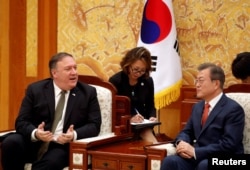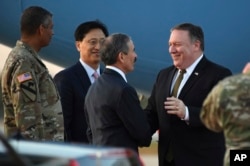US Secretary of State Mike Pompeo made his fourth trip to Pyongyang Sunday. During his day-long trip to North Korea, Pompeo and leader Kim Jong Un agreed to arrange a second summit with U.S. President Donald Trump "as soon as possible." Pompeo called the talks with Kim, productive and “another step forward" to denuclearization. However, experts aren’t as confident.
Secretary Pompeo traveled to Seoul immediately after his meeting with Kim, where he met with South Korean President Moon Jae-in and Foreign Minister Kang Kyung-wha. Moon expressed hope that a second Trump-Kim summit would make "irreversible, decisive progress in terms of denuclearization as well as the peace process."
Moon said South Korea will do everything it can to assist in facilitating a successful second US-North Korea summit. He also said the two sides will organize a working-level negotiating team to discuss the denuclearization process and the schedule of the summit.
On Monday, North Korea’s state-run news agency, KCNA, said Kim described the meeting with Pompeo as "productive and wonderful."
"Kim Jong Un expressed satisfaction over the productive and wonderful talks with Mike Pompeo at which mutual stands were fully understood and opinions exchanged," the KCNA said, adding "Together with Mike Pompeo, Kim Jong Un appreciated the positively developing situation on the Korean peninsula, explained in detail the proposals for solving the denuclearization issue and matters of concern of both sides and exchanged constructive opinions."
The KCNA said Kim believed favorable dialogue between the two countries would continue "based on the deep confidence between the two leaders of the two countries" and that he expressed thanks to the U.S. leader for making a sincere effort to implement the agreements reaching in Singapore during their first summit.
Although one U.S. official on the trip described the meeting with Kim as “better than the last time," that official also noted, "it’s going to a long haul."
Experts temper future outcomes
South Korean Foreign Minister Kang Kyung-wha said Monday that Pompeo's trip to North Korea also appears to have been successful, but would not elaborate, even though the two shared a working dinner regarding its results the previous night.
The State Department once more reported that Kim had invited inspectors to visit the Punggye-ri nuclear test site to verify it has been irreversibly dismantled.
But in an interview with Reuters news agency, Jeffrey Lewis, director of the East Asia Nonproliferation Program at California’s Middlebury Institute of International Studies, said, "Like everything else Kim has done, it is a gesture that mimics disarmament that isn’t actually disarmament."
Cheon Seong Whun, teaching research fellow at the Asan Institute for Policy Studies in Seoul, was critical, calling the outcome of Pompeo’s fourth visit to Pyongyang “much lower” than everybody expected.
"When Pompeo decided to visit Pyongyang… this meeting actually raised the hope or expectation that something important [or] substantial would come out of this meeting. But if you look at the read-out [of the meeting], there’ nothing detailed," said Cheon.
"I'm still cautiously pessimistic," said Grant Newsham, Senior Research Fellow with the Japan Forum for Strategic Studies in Tokyo.
Newsham told VOA that Pompeo has the best insight of the developments, since he’s directly involved with the behind closed door discussions with North Korea. “But I think everybody's waiting for something concrete to come out [of the talks], where the North Koreans really give up something in exchange for the Americans making a concession.”
Is North Korea serious?
A long-held sticking point in denuclearization talks with North Korea has been the divergent view on the procedural steps to achieve it. Washington continues to assert that international sanctions will remain in place until Pyongyang completes the process, while North Korea has called for various “corresponding measures” as it denuclearizes.
Many analysts believe what North Korea is looking for from the United States is a declaration ending the Korean War.
Newsham says President Trump may be inclined to offer that end of war declaration, if the U.S. thinks it will get something substantial out of doing so, like a declaration of the North's nuclear and missile programs and to allow open inspections {to nuclear testing sites like Yongbyong}.
"But until the North gives up something meaningful as a concession… I think one is properly skeptical... [that North Korea is] playing a game which we've seen many times over," said Newsham.
To that end, while the United States is committed to denuclearizing North Korea, Cheon says North Korea has an obsession to possess nuclear capabilities.
He says it may become a question if the Trump administration "will regard a partial resolution as a success or conclude that North Korea’s denuclearization is not feasible at the moment."
Newsham adds that one way Pyongyang could signal its commitment to the process, would be to move back their artillery and missiles from within striking distance of Seoul.
"That’s the one thing I would consider a real concession on the part of North Korea, as it would be giving up [their] ‘ace in the hole’ that they've had for a long time," said Newsham.
He added that the proximity of North Korean weapons to Seoul had hindered efforts by both American and South Korean administrations for decades.









